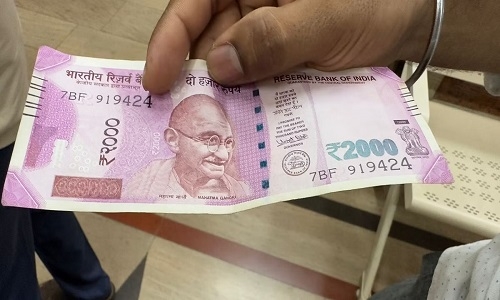Liquidity of banks to improve as Rs 2,000 currency notes being deposited: Report
31 May 2023 12:11:07

Business Bureau
The liquidity in the banking system is expected to improve to more than Rs 1 lakh crore in days to come if the current market trend of 80 per cent of Rs 2000 notes being deposited holds, a report said. “Even if a fraction of these trends are extrapolated at All Scheduled Commercial Bank's (ASCB) level, then the banking system liquidity is likely to increase significantly compared to our earlier estimates of Rs 1 trillion bulge in deposits,” said the SBI report ‘Ecowrap’ said. However, it said, this is based on the current available information and might change depending on further data. The bottom line, however, is that the interest rate cycle might have peaked decisively, it said. “As per market trends, around 80 per cent of the total Rs 2000 notes received are deposited and the rest 20 per cent are exchanged for smaller denominations,” it said.
The Reserve Bank of India (RBI) on May 19 announced the withdrawal of Rs 2000 denomination banknotes as part of its currency management and permitted the exchange of Rs 2000 currency notes up to Rs 20,000 in one go from Tuesday onwards. The exchange or deposit window is available from May 23 until September 30, 2023. SBI on Monday said it has received Rs 2,000 currency notes worth Rs 14,000 crore in deposits after the RBI move to withdraw the high-value currency notes from circulation. “Around Rs 14,000 crore worth of Rs 2,000 currency notes have come into the accounts as deposits, while notes worth Rs 3,000 crore were exchanged through the branch network. Generally, we are about 20 per cent of the market,” SBI Chairman Dinesh Khara said on Monday. Reserve Bank of India (RBI) Governor Shaktikanta Das last week said most of the withdrawn Rs 2,000 rupee notes are expected to be returned by the deadline of September 30.
The decision was part of currency management and Rs 2,000 currency notes continue to be legal tender, he had said.
Indian currency management system is very robust, exchange rate has remained stable despite crisis in financial markets due to war in Ukraine and failure of certain banks in the West, he had said. The impact of the withdrawal on the economy will be “very very marginal”, he said.